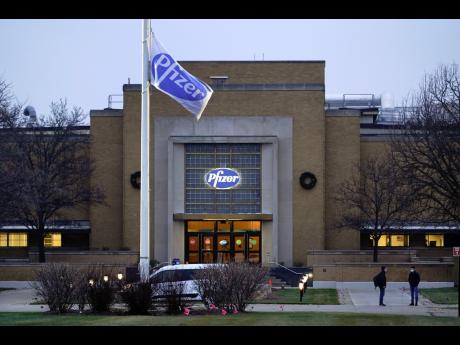US gives green light to emergency COVID-19 vaccine
(AP)- The US has given the final go-ahead to the nation’s first COVID-19 vaccine, marking what could be the beginning of the end of an outbreak that has killed nearly 300,000 Americans.
Shots for health workers and nursing home residents are expected to begin in the coming days after the Food and Drug Administration authorised an emergency roll out of what promises to be a strongly protective vaccine from Pfizer Inc. and its German partner BioNTech.
Initial doses are scarce and rationed, as the US joins Britain and several other countries in scrambling to vaccinate as many people as possible ahead of a long, grim winter. It will take months of work to tamp down the coronavirus that has surged to catastrophic levels in recent weeks and already claimed 1.5 million lives globally.
While the FDA decision came only after public review of data from a huge ongoing study, it has also been dogged by intense political pressure from the Trump administration, which has accused the agency of being too slow and has even threatened to remove FDA chief, Stephen Hahn if a ruling did not come Friday.
The move sets off what will be the largest vaccination campaign in US history, but it also has global ramifications, because it’s a role model to many other countries facing the same decision.
It offers the ability “in this situation where the pandemic is out of control, to bring hope to the people,” Dr Ugur Sahin, CEO of BioNTech, told The Associated Press.
The world desperately needs multiple vaccines for enough to go around, and the Pfizer-BioNTech shot is the first based on rigorous scientific testing to emerge from that worldwide race- a record-setting scientific achievement that shaved years off the usual process.
“I don’t think you would have found a scientist on this planet that would have predicted this 11 months ago,” said Dr Paul Offit, a vaccine expert at Children’s Hospital of Philadelphia who advises the FDA.
The US is considering a second vaccine, made by Moderna Inc. that could roll out in another week. In early January, Johnson & Johnson expects to learn if its vaccine is working in final testing.
Europe to decide on vaccine
Europe is set to make its own decision on the Pfizer-BioNTech and Moderna shots later this month, an important step, as some other candidates that multiple countries were anxiously awaiting have hit roadblocks. Friday, Sanofi and GSK announced a months-long delay after early tests showed their vaccine didn’t work well enough in older adults.
And China and Russia didn’t wait for final-stage tests before beginning vaccinations with some home grown shots.
President Donald Trump said late Friday that Pfizer had “passed the gold standard of safety,” in a video statement hailing the vaccine as “one of the greatest scientific accomplishments in history.”
About 3 million doses of the vaccine are expected in the first shipments around the country, according to officials with Operation Warp Speed, the Trump administration’s vaccine development programme. A similar amount is to be held in reserve for those recipients’ second dose.
The government still is hammering out final recommendations, but following health workers and nursing homes, it will move to vaccinate other essential workers, older adults and people at high risk because of other health problems. US authorities don’t expect enough for the general population before spring, and that’s assuming there are no manufacturing glitches.
“We would need at least until March, April, to have an impact on the pandemic,” Sahin said. But he predicted that protecting the most vulnerable could start putting a dent in hospitals and deaths sooner.
What you need to know about emergency vaccine
In a still unfinished study of nearly 44,000 people, the FDA found the vaccine was safe and more than 90 per cent effective across recipients of different ages, including older adults, races and those with health problems that put them at high risk from COVID-19. It’s authorised for people age 16 and older.
Emergency use means the vaccine is still experimental. The most important information for would-be recipients to know is:
- Some protection begins after the first dose, but it takes a second dose three weeks later for full protection. It’s unclear how long protection lasts
- The vaccine protects against COVID-19 illness, but no one yet knows if it can stop the silent, symptom-less spread that accounts for roughly half of all cases. The ongoing study will attempt to answer that but for now, the vaccinated still will need to wear a mask and keep their distance
- Expect a sore arm and some flu-like symptoms, such as fever, fatigue, headache and chills after the second dose. Although uncomfortable, those reactions only last about a day. “That’s just your immune system working. It’s a good thing,” Offit said
- Authorities are investigating several allergic reactions reported in Britain by health workers among people with a history of severe allergies. The FDA said people must have treatments for allergic reactions on hand before they are administered with the vaccine, and not give it to those with a known history of severe allergic reactions to any of its ingredients
- Every vaccine recipient must be given an FDA-written fact sheet about the vaccine and its known risks and benefits
- FDA didn’t forbid the vaccine’s use in pregnant women, but noted there isn’t enough evidence to determine its safety in that group
Follow The Gleaner on Twitter and Instagram @JamaicaGleaner and on Facebook @GleanerJamaica. Send us a message on WhatsApp at 1-876-499-0169 or email us @onlinefeedback@gleanerjm.com or editors@gleanerjm.com.

